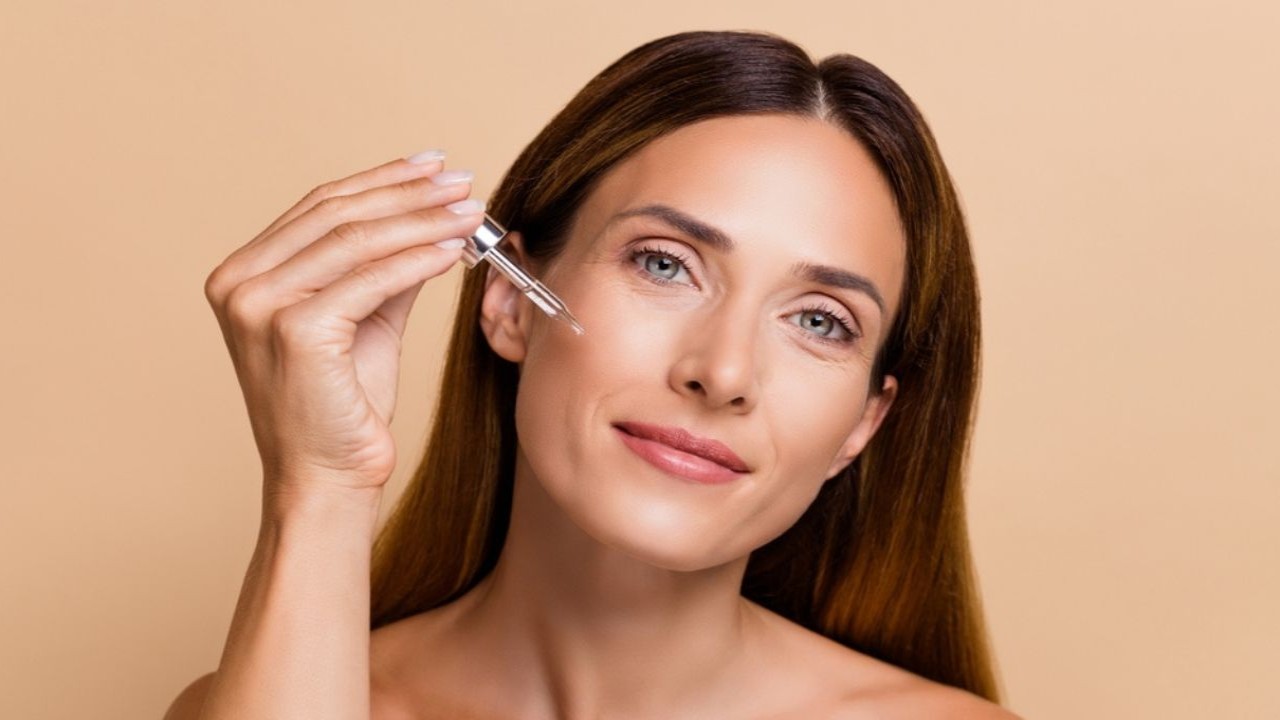How to Use Hyaluronic Acid for Skin: Steps, Tips, And Precautions
Go through our detailed guide on how to use hyaluronic acid for the skin and say goodbye to wrinkles, dark spots, dryness, loss of elasticity, and fine lines.

In the realm of skincare, choosing products with the right ingredients can be a game-changer. One such ingredient that is making rounds these days on the Internet, and gaining immense popularity is hyaluronic acid. Also known as hyaluronan, it is a substance naturally found in the fluids of eyes and joints. Hyaluronic acid acts as a natural humectant and helps draw and retain moisture into the skin, making it soft and supple (1).
Although there are various benefits and uses of hyaluronic acid for the skin, using it in an incorrect way won’t let you reap all its benefits. Here is our detailed guide on how to use hyaluronic acid for the skin and boost skin health. Let’s delve into the world of hyaluronic acid and learn how using this amazing ingredient can help improve the overall appearance of the skin. Dr. Sravya C Tipirneni, Chief Consultant Dermatologist & Cosmetologist at Manipal Hospital, says, “Hyaluronic acid acts like a moisture magnet in your skin, plumping it up and reducing the appearance of wrinkles. It can also help improve skin texture and elasticity.
What Is Hyaluronic Acid And What Does It Do for Skin?

Hyaluronic acid is a clear, semi-viscose, naturally occurring substance found throughout various human tissues, including skin, eyes, and connective tissues. It possesses anionic properties that make it attract water to the skin, making the skin softer and providing structural support.
When our skin starts to age, it starts losing hyaluronic acid and collagen, thus causing wrinkles and fine lines. Using hyaluronic acid helps fight the signs of aging, revealing a youthful complexion (2). Plus, being a biologic humectant, it soothes severely dry skin, keeping it nourished and hydrated.
The various properties of hyaluronic acid make it a boon for the skin. Let us understand the benefits of hyaluronic for the skin in detail below.
4 Remarkable Benefits of Hyaluronic Acid for Skin
1. Hydrates the Skin
Dry and dehydrated skin can be a nuisance to deal with — when the skin lacks enough moisture, it leads to rough patches, itchiness, scaliness, and loss of elasticity (3). The more severe cases of dry skin can also lead to infections — it may also cause your skin to crack, making way for bacteria and pathogens to enter into your skin, leading to infections (4).
Hyaluronic acid is highly efficient in retaining moisture in the skin, thereby lubricating the skin and soothing the symptoms of dryness (5). Applying hyaluronic acid in the form of serums, creams, moisturizers, and lotions can help one treat dry and flaky skin (6).
2. Fights the Signs of Aging

Dry and dehydrated skin is more prone to a compromised skin barrier (7). An effective skin barrier helps protect the skin against premature signs of aging. Fine lines, wrinkles, and other signs of skin aging are all major causes of a weak skin barrier (8).
Hyaluronic acid, with its potent moisturization properties and humectant effects, helps keep the skin hydrated, which in turn also strengthens the skin’s barrier — ideal for keeping wrinkles, fine lines, and other signs of aging (9). A hydrated skin barrier, in turn, protect the skin from environmental damage and keep it healthy.
3. Reduces the Signs of Hyperpigmentation
Hyperpigmentation is a common skin condition, characterized by dark patches on the skin. There are three types of this condition, namely, melasma, sunspots, and post-inflammatory hyperpigmentation, all of which exhibit different symptoms (10). One of the major causes of hyperpigmentation is an excess of melanin in the body — this is where the use of hyaluronic acid comes into play.
Using hyaluronic acid on the skin can help boost collagen production, prevent transepidermal water loss, promote skin elasticity, and improve the signs and symptoms of hyperpigmentation, making your skin brighter and more even-toned (11), (12).
4. Soothes Inflammation
Skin inflammation is a common skin concern that manifests as irritation, redness, or swelling. It can be caused by various factors, including a weak immune system, infections, or allergic reactions (13). It is a challenging condition to deal with but not if you have hyaluronic acid products at your disposal.
Research revealed that hyaluronic acid exhibits powerful anti-inflammatory properties that not only help calm the symptoms of inflammation but also accelerate the wound healing process (14).
5. Protects Skin Against UV Damage
It is a widely known fact that exposure to the sun can harm the skin in more ways than one, and time and again researchers have proven the same. When skin is exposed to sun rays, it can cause sunburns, wrinkles, fine lines, dark spots, inflammation loss of elasticity, and in worse cases, may also lead to skin cancer (15).
It is therefore clearly understood that shielding skin from UV rays is crucial — hyaluronic acid has proven efficacy in protecting the skin from UV damage. Its antioxidant properties help maintain the skin’s strength and safeguard it from the damaging effects of sun rays (16).
6. Improves the Overall Appearance of Skin

By keeping the skin hydrated, promoting skin elasticity, preventing premature signs of aging, and protecting the skin from sun damage — hyaluronic acid plays a pivotal role in giving you radiant and healthy skin. Now that we know the amazing benefits and uses of hyaluronic acid, let us now take a look at different types of hyaluronic acid.
Types of Hyaluronic Acid Explained

In the realm of skincare, various forms of hyaluronic acid are used to offer extra hydration and anti-aging benefits. Below are three types of hyaluronic acid used in skincare formulations:
1. Sodium Hyaluronate:
This is a beneficial ingredient used in various cosmetic formulations and is the sodium salt form of hyaluronic acid. It is hydrophilic in nature and mixes easily with water. It boosts skin hydration levels by drawing water into the skin. It has a low molecular weight and is considered to be non-comedogenic, meaning it won’t clog pores when topically applied to the skin (17).
2. Sodium Acetylated Hyaluronate:
This is another version of hyaluronic acid that possesses excellent hydrating properties. It is derived from the Natural Moisturizing Factor (NMF) sodium hyaluronate. It is used in skincare formulations to replenish dry skin, boost skin elasticity, and fight the signs of aging such as fine lines and wrinkles (18).
3. Hydrolyzed Hyaluronic Acid:
This is another derivative of hyaluronic acid that has a low molecular weight and easily penetrates the skin to provide it with the hydration and nourishment it needs. It exhibits amazing humectant and anti-aging properties to help one get more hydrated and refined skin (9).
ALSO READ: Cornflour for Face: Amazing DIY Face Packs to Try for Clear Skin
How to Use Hyaluronic Acid And Get Radiant Skin

Using hyaluronic acid and reaping all its benefits is quite easy. You just need to invest in skincare products infused with the goodness of HA and rejuvenate your skin. Below are some amazing ways to use hyaluronic acid and unveil radiant skin:
1. Opt for a Hyaluronic Acid Cleanser:
If you have dry skin, it is highly recommended that you pick a gentle cleanser that contains hyaluronic acid. This will help you eliminate all the dirt, impurities, and grime without disturbing the natural oils of your skin.
2. Use a Hyaluronic Acid Serum:
Face serums have become an all-time favorite of skincare enthusiasts all around the world — their benefits range from boosting collagen to providing utmost nourishment to the skin. A face serum packed with hyaluronic acid can help you calm irritated skin and offers the nourishment your skin needs to stay fresh and clear. Use the hyaluronic serum after you wash your face, allow it to absorb, and then continue with your regular skincare routine.
3. Pick a Hyaluronic-acid Moisturizer:
No skincare routine is complete without slathering a moisturizer or a body lotion. One of the easiest ways to use hyaluronic acid is to apply a moisturizer containing hyaluronic acid and get 24-hour hydration.
4. Use It to Do Your Makeup:
Various makeup products, including foundations, concealers, lipsticks, and so on are infused with hyaluronic acid to calm and soothe the skin. Add these products to your vanity and get flawless makeup and a dewy glow at the same time. Dr. Sravya further adds, “Makeup products formulated with hyaluronic acid can provide additional hydration throughout the day, leaving your skin feeling fresh and dewy.”
5. Use the Products Religiously:
Adding hyaluronic acid to your skincare routine can make sure that you don’t have to worry about dark circles, roughness, scaling, flakiness, and itchiness — reason being, the various properties of hyaluronic acid take care of these skincare concerns, making sure you make heads turn with flawless skin wherever you go!
Who Should Use Hyaluronic Acid on Skin?

Anyone can use hyaluronic acid to maintain their skin health, but it is mostly recommended for people with severely dry and dehydrated skin. Below are certain conditions in which hyaluronic acid products can help:
1. Dry Skin:
As already mentioned in the article above, hyaluronic acid is a natural humectant, which means it seals moisture into the skin and prevents dryness. People with dry and flaky skin should use products with hyaluronic acid for moisture retention.
2. Oily Skin:
Hyaluronic acid is light in texture and has a low comedogenic rating that makes it a suitable choice for those with oily and acne-prone skin. According to our contributor Dr. Nimrita Kaur, an aesthetics doctor, BDS, and MSc in Clinical Cosmology, “Hyaluronic acid protects oily skin by providing lightweight hydration without clogging pores. It helps maintain the skin's moisture balance, reducing excess oil production. Its ability to attract and retain water keeps the skin hydrated, plump, and healthy without contributing to greasiness.”
3. Aging Skin:
As it also exerts anti-aging effects, those dealing with premature signs of aging or those with mature skin are advised to use skincare products laden with hyaluronic acid.
4. Sensitive And Inflamed Skin:
Since hyaluronic acid has anti-inflammatory properties and feels light on the skin, it can also be used by individuals with sensitive skin types or those dealing with inflammation to soothe their skin.
Are There Any Side Effects of Hyaluronic Acid?
Hyaluronic acid is a substance that occurs naturally in the body, hence it is highly likely that you won’t get an adverse reaction upon using it. Having said that, doing a patch test is always recommended before using it on your skin. In rare cases, hyaluronic acid fillers may cause bruising, redness, itching, and swelling. If you notice any discomfort after the use of hyaluronic acid, seek medical attention (2).
Who Should Not Use Hyaluronic Acid?
Although hyaluronic acid is safe to use for everyone, those dealing with Scleroderma should steer clear of it, as it may trigger allergies (19). “Hyaluronic acid is generally safe for all skin types, but individuals with specific allergies or sensitivities to hyaluronic acid products should avoid using them. Additionally, those with skin conditions requiring specialized treatment should consult a dermatologist before incorporating hyaluronic acid into their skincare routine.” says Dr. Nimrita.
How to Choose the Best Hyaluronic Acid Products?

Before adding hyaluronic acid to your skincare routine, there are a few things to consider, such as:
1. Skin Type:
There are multiple products with hyaluronic acid that cater to different skin types — whether you are buying a skincare product like face wash or eye cream or a makeup product such as lipstick, it’s important to pick a product that suits your skin type. When picking a hyaluronic acid-based product, go through the label to know if it is formulated for your skin type or not.
2. Fragrance:
Soothing aromas are liked by most people, but people with sensitive skin should be wary of using beauty products containing artificial fragrances.
3. Skin Concerns:
Hyaluronic acid solves a host of skin concerns — from wrinkles to loss of moisture, it solves a variety of problems to keep the skin strong. Choose a product that addresses your skin concern. For instance, if fine lines are bothering you, choose a hyaluronic acid serum that has other anti-aging ingredients, too. Likewise, if you have oily skin, you can use a hyaluronic acid toner packed with green tea or other acne-fighting ingredients.
4. Formulations:
Sometimes, less means better, especially when it comes to skincare. If you have just incorporated hyaluronic acid into your skincare routine, it would be better to use a product that has a lean formula.
Conclusion
We hope our guide helped you get the answer to the question “How to use hyaluronic acid.” When used correctly and regularly, it can help you bid adieu to various skin woes. But just like any other skincare ingredient, it could cause side effects, too — doing a patch test before use can help you avoid any unwanted allergies or irritation. Hyaluronic acid pairs exceptionally well with other skin-friendly ingredients too, including retinol, AHAs, BHAs, plant extracts, and vitamins. Choose a product with a gentle formula and unleash your magical beauty!
Contributor: Dr. Nimrita kaur





 JOIN OUR WHATSAPP CHANNEL
JOIN OUR WHATSAPP CHANNEL























































